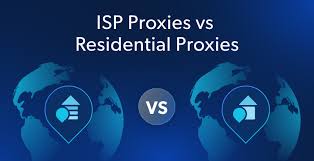What Are ISP Proxies?

ISP proxies, also known as static residential proxies, use IP addresses assigned by Internet Service Providers (ISPs) but are hosted on data center servers. This unique combination gives them the speed and reliability of data center proxies, along with the legitimacy of residential proxies. Unlike regular residential proxies, ISP proxies maintain a static IP address, making them effective for activities requiring consistency, like account creation, managing multiple social media accounts, and ad verification.
How Do ISP Proxies Work?
ISP proxies operate similarly to other proxies by rerouting your internet traffic through a different IP address. Here’s how they work:
- Data Center Infrastructure: They are hosted on fast servers, ensuring consistent speed and uptime while maintaining the appearance of a residential IP.
- IP Masking: ISP proxies mask your original IP address with one assigned by a real ISP, giving your traffic a more authentic look.
- Static IPs: Unlike rotating proxies, ISP proxies keep the same IP address throughout a session, making them suitable for tasks that need a consistent IP presence.
Benefits of Using ISP Proxies
ISP proxies offer several distinct advantages:
- High Speed and Low Latency: Because they are hosted on powerful servers, ISP proxies provide faster response times and lower latency compared to traditional residential proxies.
- Better Reliability: ISP proxies maintain a constant IP address, reducing the chances of being flagged or blocked during activities like managing accounts or running automated scripts.
- Increased Trust and Legitimacy: Websites often trust ISP proxies more than data center proxies due to their residential nature, improving success rates in accessing restricted content.
- Versatility: They are suitable for web scraping, social media management, e-commerce activities, and streaming due to their speed and stability.
Use Cases for ISP Proxies
ISP proxies are versatile tools that can be used across various industries:
- Ad Verification:
- Marketers use ISP proxies to verify ad placements, ensuring that they display correctly in different regions.
- Social Media Management:
- ISP proxies help manage multiple accounts across social media platforms without triggering IP bans.
- E-commerce Operations:
- They are used for monitoring competitor pricing, product availability, and accessing region-specific information.
- SEO and SERP Monitoring:
- SEO specialists use ISP proxies to track search engine results accurately and gather location-specific data.
Choosing the Right ISP Proxy Provider
When selecting an ISP proxy provider, consider:
- Server Locations: Choose a provider that offers IPs from the regions you need to target.
- Performance: Look for providers with high uptime, fast connections, and minimal latency.
- Security: Ensure that the proxies offer robust encryption and privacy protection.
- Support and Reliability: Opt for a provider known for excellent customer support and reliable infrastructure.
ISP Proxies vs. Residential Proxies
While both are seen as residential IPs, ISP proxies have static IPs hosted on data center servers, providing faster speeds. Residential proxies, on the other hand, are often slower due to their dynamic IP rotation but offer higher levels of authenticity.
Final Thoughts
ISP proxies blend the speed of data center proxies with the trust of residential IPs, making them ideal for a wide range of applications. They offer reliable performance, greater legitimacy, and consistent IP usage, making them a preferred choice for tasks like ad verification, social media management, and e-commerce operations. Investing in a reliable ISP proxy service can provide seamless access to online content while maintaining anonymity and speed.






